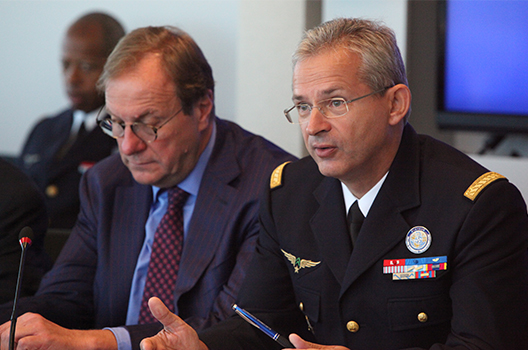 As new waves of turmoil erupt across the Middle East, North Africa, and Europe’s southern borders, getting cooperative crisis management right will be critical for the future of transatlantic and international security. To tackle this challenge, on October 3rd and 4th, the Atlantic Council, in partnership with NATO Allied Command Transformation, hosted a special two-day private workshop on Stability Operations: 2020 and Beyond. This workshop convened top NATO, United Nations, European Union, government, and NGO officials to explore how various stakeholders can optimize stabilization activities during international crises.
As new waves of turmoil erupt across the Middle East, North Africa, and Europe’s southern borders, getting cooperative crisis management right will be critical for the future of transatlantic and international security. To tackle this challenge, on October 3rd and 4th, the Atlantic Council, in partnership with NATO Allied Command Transformation, hosted a special two-day private workshop on Stability Operations: 2020 and Beyond. This workshop convened top NATO, United Nations, European Union, government, and NGO officials to explore how various stakeholders can optimize stabilization activities during international crises.
The workshop featured a keynote address by General Denis Mercier, NATO’s Supreme Allied Commander Transformation, who shared his insights on creating more effective institutional cooperation among the broad range of actors involved in stabilization activities. During the subsequent panel discussions, representatives and experts from NATO, the European Union, United Nations, African Union, US Department of State, allied and partner embassies, International Committee of the Red Cross, International Organization for Migration, USA for UNHCR, and Mercy Corps helped to map out the current field of crisis management. Speakers shared their perspectives on their organizations’ respective goals and challenges in global stabilization operations.
The event presented a valuable opportunity to complement official NATO-EU-UN coordination by engaging a wider range of stakeholders involved in crisis management and stability operations. Through plenary sessions and small group scenario-based discussions, this workshop aimed to take the first steps toward boosting coordination by establishing a common understanding of roles and functions among actors, enhancing communication and information sharing mechanisms, sharing best practices, and generating actionable recommendations to improve crisis management for the future. Detailed outcomes of the workshop will be outlined in a forthcoming project white paper.
Image: Fred Kempe, President and CEO of the Atlantic Council and General Denis Mercier, NATO’s Supreme Allied Commander Transformation.
